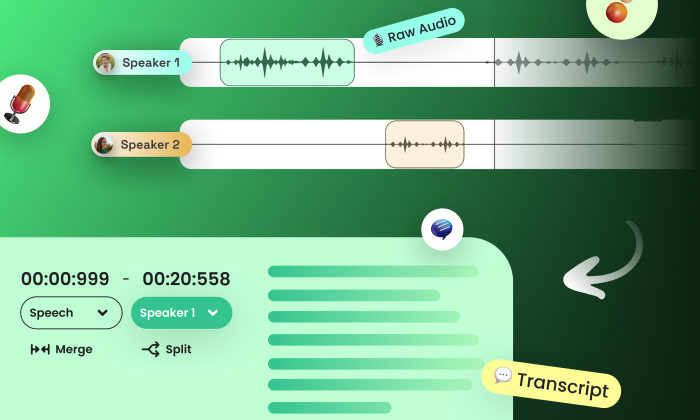Can you scale to hundreds of doctors across multiple regions for doctor dictation dataset?
Dataset Scaling
Healthcare
Speech AI
Scaling the collection of doctor dictation datasets to encompass hundreds of doctors across various regions is not just feasible; it is essential for advancing healthcare technology. This capability creates diverse datasets that significantly enhance applications like automatic speech recognition (ASR), clinical decision support, and electronic medical record (EMR) automation. Here's how FutureBeeAI ensures effective scaling and the implications it brings.
The Importance of Scaling Doctor Dictation Datasets
Doctor dictation datasets are critical for training AI models that accurately process medical documentation. These datasets consist of monologue-style recordings where clinicians verbally record patient information, differing from interactive patient-doctor dialogues. Scaling this collection effort is crucial for several reasons:
- Diverse Medical Terminology: Different medical specialties use unique terminologies. By including recordings from various fields, such as cardiology, pediatrics, and psychiatry, AI systems can better interpret the nuances of medical language.
- Regional Accents and Dialects: Healthcare professionals communicate in diverse accents and dialects. Including this variation ensures AI models can understand and transcribe accurately across different populations.
- Robustness and Adaptability: Data from clinicians using different devices in various environments (e.g., hospitals, clinics) helps train models to handle a wide range of audio qualities and background noise, enhancing ASR systems' resilience.
Effective Strategies for Scaling Doctor Dictation Dataset Collection
Establishing a Collection Framework
- Clinician Recruitment: Engage a diverse network of licensed healthcare providers across multiple regions, ensuring a mix of specialties and language capabilities to enhance dataset representativeness.
- Utilizing Technology Platforms: Platforms like Yugo facilitate the scheduling and management of recordings, ensuring participant quotas are met and data collection is streamlined.
- Defining Recording Standards: Establish guidelines on audio characteristics (e.g., mono WAV, 16 kHz/16-bit), dictation types (spontaneous vs. guided), and content structure to maintain consistency across recordings.
Ensuring Compliance and Quality
- Informed Consent and Compliance: Obtain explicit consent from clinicians, ensuring they understand privacy measures. Adhere to regulations like HIPAA and GDPR through robust data protection protocols.
- Quality Assurance Protocols: Implement a dual-layer QA pipeline, automated checks for audio quality and human reviews for transcription accuracy, maintaining high data quality standards.
Leveraging Metadata for Insights
- Detailed Annotations: Capture metadata about speaker demographics, specialty, recording environment, and device type. This information is invaluable for training models to generalize across different contexts.
- Tracking Variations: Document regional or specialty-specific variations in terminology or dictation style, informing model fine-tuning and improving performance.
Key Challenges in Scaling and Strategic Lessons for Success
- Participant Engagement: Sustaining clinician participation can be challenging. Clear communication about project goals and fair compensation helps maintain interest.
- Ensuring Data Consistency: Variability in dictation styles can lead to inconsistencies. Providing detailed guidelines and examples mitigates this issue, ensuring recordings adhere to desired standards.
- Balancing Quantity and Quality: While increasing the number of recordings is essential, maintaining data quality is equally important. A balanced approach that prioritizes both is key to successful dataset creation.
Real-World Impacts and Use Cases
Scaling doctor dictation datasets enables AI models to understand complex medical terminology, leading to improved ASR systems that enhance clinical documentation. This advancement supports better patient care by streamlining clinical workflows and ensuring accurate medical record-keeping.
For projects requiring large-scale, diverse datasets, FutureBeeAI's robust collection platform can deliver production-ready datasets efficiently, ensuring compliance and quality. Our end-to-end solutions support the creation of scalable and reliable AI models that meet the growing demands of the healthcare industry.
Smart FAQs
Q: What specialties should be included in a doctor dictation dataset?
A: Include a wide range of specialties such as internal medicine, pediatrics, cardiology, and psychiatry to ensure the dataset captures diverse medical terminologies and practices.
Q: How is compliance ensured during data collection?
A: Compliance is ensured by obtaining informed consent from participants, implementing strict data protection measures, and conducting regular audits to align with HIPAA and GDPR requirements.
What Else Do People Ask?
Related AI Articles
Browse Matching Datasets
Acquiring high-quality AI datasets has never been easier!!!
Get in touch with our AI data expert now!








